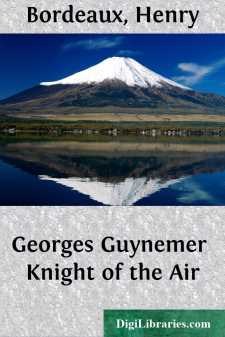History
- Africa 30
- Americas (North Central South West Indies) 50
- Ancient 68
- Asia 58
- Australia & New Zealand 8
- Canada 41
- Caribbean & West Indies 1
- Civilization 20
- Eastern Europe 12
- Europe 310
- Expeditions & Discoveries 60
- General 77
- Historical Geography 1
- Jewish 9
- Latin America 3
- Medieval 8
- Middle East 13
- Military 248
- Revolutionary 8
- Study & Teaching 5
- United States 353
- Western Europe 56
- World 13
History Books
Sort by:
INTRODUCTORY The close of the fifteenth century had left the whole structure of mediæval Europe to all appearance intact. Statesmen and writers like Philip de Commines had apparently as little suspicion that the state of things they saw around them, in which they had grown up and of which they were representatives, was ever destined to pass away, as others in their turn have since had. Society was...
more...
by:
Henry Bordeaux
CANTO I CHILDHOOD I. THE GUYNEMERS In his book on Chivalry, the good Léon Gautier, beginning with the knight in his cradle and wishing to surround him immediately with a supernatural atmosphere, interprets in his own fashion the sleeping baby smiling at the angels. "According to a curious legend, the origin of which has not as yet been clearly discovered," he explains, "the child during...
more...
CHAPTER I. CHARLES X. AND THE DAYS OF JULY. Louis XVIII. in 1815 returned to his throne, borne on the shoulders of foreign soldiers, after the fight at Waterloo. The allied armies had a second time entered France to make her pass under the saws and harrows of humiliation. Paris was gay, for money was spent freely by the invading strangers. Sacrifices on the altar of the Emperor were over; enthusiasm...
more...
CHAPTER I INTRODUCTORY The declaration of war—Sir George White and the defence of Natal—The force at Glencoe—Battle of Talana Hill—General Yule's retirement—Battle of Elandslaagte—Useless victories—Enemy's continued advance. Before taking up the history of the siege proper it will be well here to pass briefly in review the events which led up to the isolation and investment of...
more...
PREFACE This book is not intended to be a full or detailed history of animal morphology: a complete account is given neither of morphological discoveries nor of morphological theories. My aim has been rather to call attention to the existence of diverse typical attitudes to the problems of form, and to trace the interplay of the theories that have arisen out of them. The main currents of morphological...
more...
CHAPTER I A shelf full of books belonging to the American children of colonial times and of the early days of the Republic presents a strangely unfamiliar and curious appearance. If chronologically placed, the earliest coverless chap-books are hardly noticeable next to their immediate successors with wooden sides; and these, in turn, are dominated by the gilt, silver, and many colored bindings of...
more...
CHAPTER I. The remotest fact in the history of England is written in her rocks.Geology tells us of a time when no sea flowed between Dover and Calais,while an unbroken continent extended from the Mediterranean to theOrkneys. Huge mounds of rough stones called Cromlechs, have yielded up still another secret. Before the coming of the Keltic-Aryans, there dwelt there two successive races, whose story is...
more...
CHAPTER I. Foundation building is neither picturesque nor especially interesting, but it is indispensable. However fair the structure is to be, one must first lay the rough-hewn stones upon which it is to rest. It would be much pleasanter in this sketch to display at once the minarets and towers, and stained-glass windows; but that can only be done when one's castle is in Spain. Would we...
more...
CHAPTER I. One of the greatest achievements of modern research is the discovery of a key by which we may determine the kinship of nations. What we used to conjecture, we now know. An identity in the structural form of language establishes with scientific certitude that however diverse their character and civilizations, Russian, German, English, French, Spaniard, are all but branches from the same...
more...
by:
Thomas H. Benton
PREFACE IN THE SOCRATIC MANNER "Nothing broadens and mellows the mind so much as foreign travel."—Dr. Orison Swett Marden. The scene is the brow of the Hungerberg at Innsbruck. It is the half-hour before sunset, and the whole lovely valley of the Inn—still wie die Nacht, tief wie das Meer—begins to glow with mauves and apple greens, apricots and silvery blues. Along the peaks of the great...
more...











